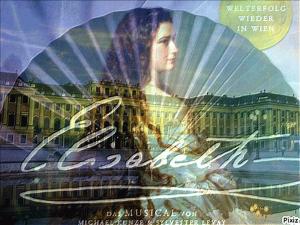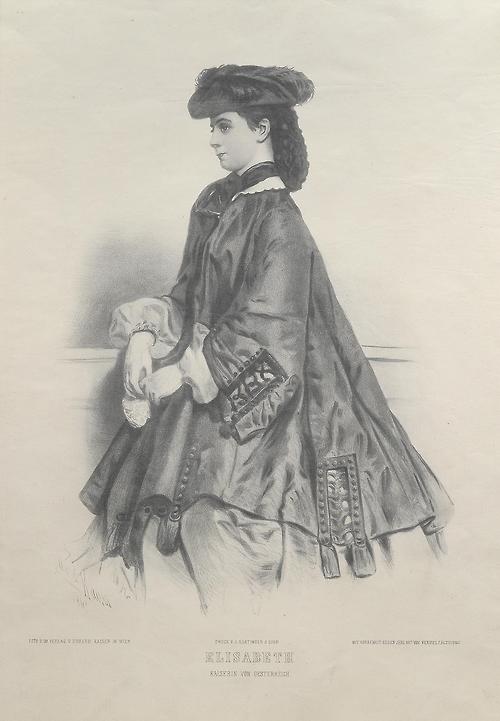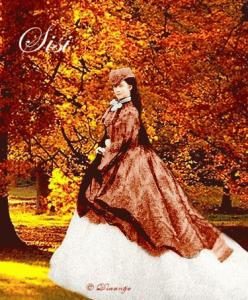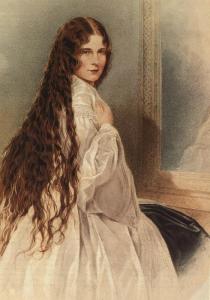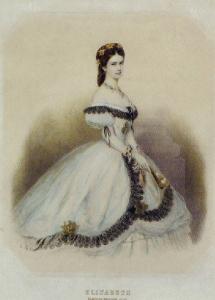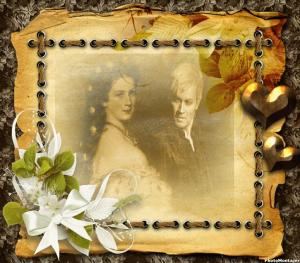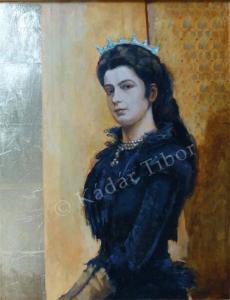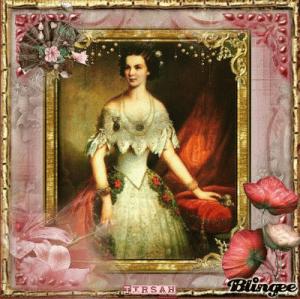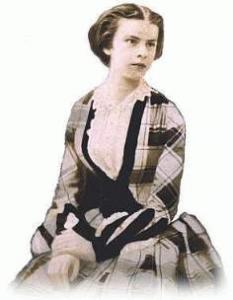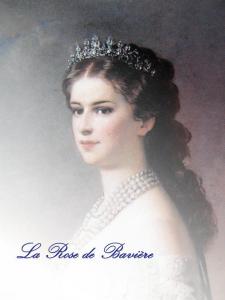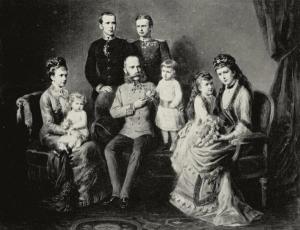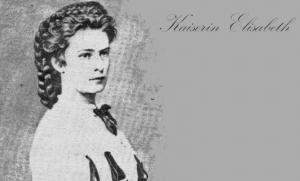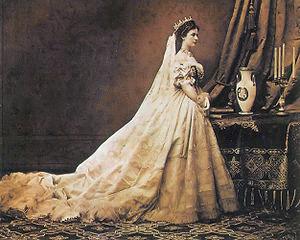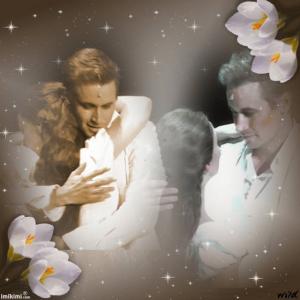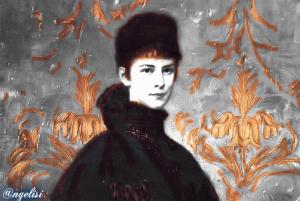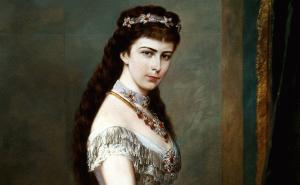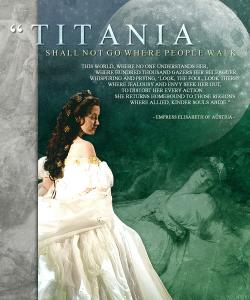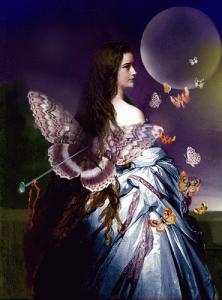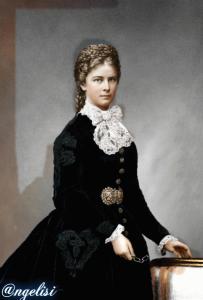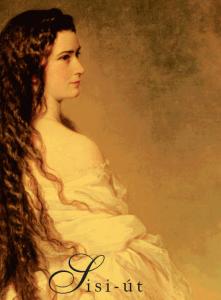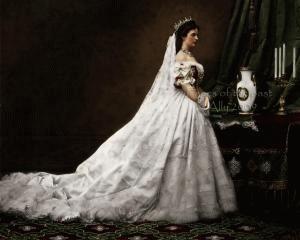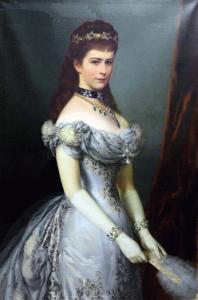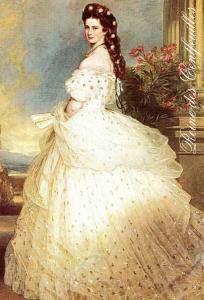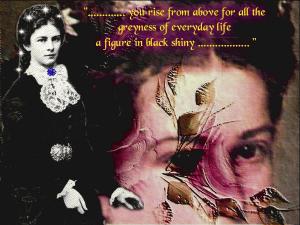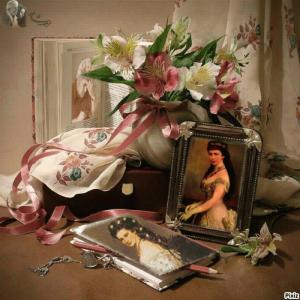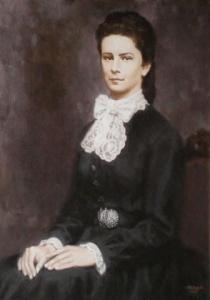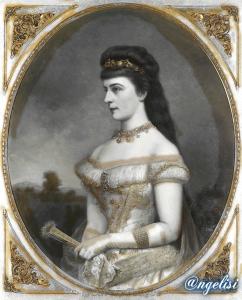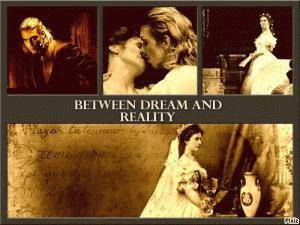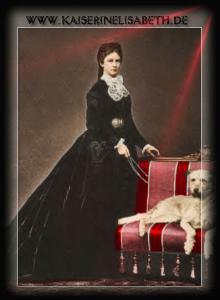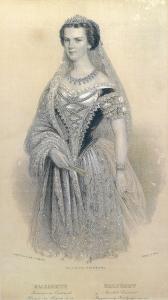Is official the new Elisabeth in the famous musical is " ROBERTA VALENTINI " (born August 30, 1981 in Nuremberg) is a musical performer with Italian citizenship.
Post-high school Valentini graduated from initially trained as a wholesale and foreign trade clerk in Nuremberg. From 2002 to 2006 she studied singing, dancing and acting at the Bavarian Theatre Academy August Everding in Munich.
First experience in musicals, she gained among others as Eponine in Les Misérables at the Court Theatre Nuremberg. At the Bregenz Festival in 2003 it belonged to the ensemble of Leonard Bernstein's West Side Story, and was seen there in 2004 in the role of Francisca, as well as in the concert performance of Bernstein's Wonderful Town. In November 2003, she stood as a Daisy in Musical Fletsch-Bite Fever Saturday on stage at the Academy Theatre, a year later, she joined the Prince Regent Theatre as a soloist in the Gala Bring on Tomorrow on.
In Stephen Sondheim's Into the Woods she worked at the same place in March 2005 with Florinda. After that she was seen at the Thun lake games in the musical Elisabeth Countess Esterhazy as and in the title role. In the Metropol Theater in Munich, she played Mrs. Kendall in The Elephant Man and the Staatstheater Braunschweig gave them in the musical Fiddler on the Chava.
Since October 2007, Roberta Valentini was in the musical Wicked - The Witches of Oz to see the Palladium Theater in Stuttgart, where she alternately occupied the role of Elphaba, she took over the metronome again Theater in Oberhausen from March 2010.
From January 2009 to May 2009 Roberta Valentini played the main role in the musical Marie Antoinette Musical Theater Bremen. In addition, Roberta Valentini sings in several band formations. Since 25 September 2011, it was as Florence Vassy in Chess Musical Theater in Bielefeld. From 12 November 2011 to 18 May 2012, she starred as Ulla in Musical Kein Pardon at the Capitol Theater in Dusseldorf. Currently, Roberta Valentini is to see in the city of Münster as Edwin Drood theater in the eponymous musical. As of May it is in Theater Bielefeld in the musical to be seen "City of angels".
Her younger brother Enrico Valentini is professional football player for Karlsruher SC.
From Wikipedia anciclopedia online
Sissy Operette

Sissy (operetta)
Sissy is a musical comedy in two acts (four scenes) by Fritz Kreisler that the 'operetta is near. The libretto was written by the brothers Ernst and Hubert Marischka. It is based on the play Sissy Brautfahrt Decsey Ernst and Gustav Holm. The work was premiered December 23, 1932 at the Theater an der Wien in Vienna Paula Wessely He played the main role.
Time and place
The work plays in the Castle of Possenhofen on Lake Starnberg in Bavaria and in Ischl in Austria from 15 to 17 August 1853.
First Act
For a couple of days of nerve-wracking business of the State to recover, Duke Max of Bavaria, he moved with his wife Louise and daughters Sissy and Nene seal Possenhofen. However Duchess Luise can not come to terms with the rest. She knows that her sister, the Archduchess Sophia of Austria, together with their son, unmarried young Emperor Franz Joseph, just bored at Ischl. Now he waits impatiently waiting to be picked up by an imperial servants. Nene who should accompany you on your journey. The sisters Louise and Sophie are hoping that the emperor found on Nene favor and the court of Vienna would have ended in Ischl with a commitment of children.
Even comes the imperial messenger, bringing the two guests from. Nene is, however, the plan did not his mother, is still fell recently in Prince of Thurn and Taxis. In the race she even forgets to take her court dress.
Sissy fails to understand that his father did not receive an invitation. Finally, he said a word in deciding the fate of his daughter. He speaks so long on him until he decides, his wife and his daughter Nene nachzureisen. Sissy accompanied him and also takes the dress forgotten.
When the emperor just sat down to breakfast and take a look through the window, he found a girl in the park collects flowers. This is outrageous and commands that we should show the person brazen. Meanwhile, the Duke Max is able to be allowed in the villa. Franz Joseph receives him kindly, and before you know it, swap the two experiences of hunting. As soon as they are separated again, leads a security guard in Blumenpflückerin. Why is she wearing a dress in a box, was held by the emperor for a seamstress. But before the girl can imagine, Franz Joseph is called to his mother, who wants to introduce him to Nene. When you hear what is being played here, his mood worsened, and his bride receives is intended reluctantly. In his mind he still lives in the "seamstress", which has left a deep impression on him.
Second Act
The urban Männergesangverein the Emperor wants to serenade her birthday today and passionate in samples. Duke Max arrives incognito to do so. Through his affable manner, immediately won the confidence of the singer. But when you enter the emperor's mother with his sister, the venue, the Sangesfreunde retire discreetly. The two sisters are surprised to find Max to be found here, and a little later, still looms Sissy. This takes fully in the subsequent discussion, for his father's party.
In the evening, the Archduchess Sofia can be aligned in the park in front of the imperial villa a party. She and her sister Luise hope Franz Joseph'm going to take this opportunity to announce her engagement soon Nene. Preparations are still in full swing when Sissy comes with the dress that she wants to bring her sister. First, however, he runs straight into the arms of the emperor. Why is she worried about her sister, she asks him openly as the engagement has been advanced. To his delight, he feels that his Majesty would not mind thinking, acting only as a pawn in the plane of the mother. This good news will bring about equal sissy Nene. The two ladies will be intercepted by her mother. When Max finally, he added, the conversation degenerates into a family dispute. Now he wants to know what was going on here, even the emperor. Now we learn the true identity of "seamstress".
The birthday party begins: The glee club takes the monarch serenade. Then enter the dancers do their best. Franz Joseph uses the first pulse Sissy chance to dance. While it weighs in waltz with him, they both feel that they are meant for each other. At the climax of the festival, the Emperor announced his engagement to Sissy. Nene submits to her beloved Prince of Thurn and Taxis in her arms.
Music
Fritz Kreisler has a lot of songs from the repertoire of his pieces he composed for solo violin on loan to the score of his Singspiel, so for example the march of Vienna, the pain of love - love Freud, Schön Rosmarin Caprice and viennoise . Among the compositions created for the operetta as its musical events yet the two waltz a quiet happiness, a little 'bit of music' and I would 'so in love once highlighted.
Background
1931 Hubert bought the game Marischka Sissy Brautfahrt Decsey Ernst and Gustav Holm. Together with his brother Ernst and Marischka game authors wrote in a book of a musical comedy by the name of Sissy. As a composer Bruno Granichstaedten was available, but since he arrived from New York a telegram from the producer Shubert Brothers, "a booklet for the research of Fritz Kreisler." Without further ado Granichstaedten was with another manual work, while the libretto for Sissy in New York has been sent.
Before the premiere, which will be held in preview of Christmas Josefstadt Theatre Kreisler stated in the notice that he had canceled all his concerts and the Americans withdrew $ 50,000 fee to conduct the premiere of Vienna can. Wessely played Sissy, Hans Jaray Franz Joseph and Hubert Marischka father of Sissy Duke Max The theater was sold out for weeks.
Actress Paula Wessely, famous theater actress who was a newcomer to the field of operetta. With their vocal studies was preparing for his role before, but had the three highest notes of the song Got My Mind as a crush on a singer behind the stage to take effect. Wessely himself later recalled, his voice is due to the scenes in the aforementioned short scream hit comedy Rose Bernd been compromised for a long time. The duet Yeah, who says so ... I talked about it and Jaray, and the beginning of the song I think my luck is holding today went on the back of a garden in which an invisible singer was ready.
Since the end of the presentation imperial anthem was sung, the audience stood up, even if the monarchy was abolished for 14 years.
As Wessely had to meet their obligations at the Theater in der Josefstadt, there was a second and third job. Hedy Kiesler was the second Sissy. It 'appeared as a special deposit with the opening of the curtain on a horse, while a few bars were played the imperial anthem, but perished in the applause soaring. The third jet was Sissy Rose Stradner.
Sissy was played 289 times en suite. After the 'Anschluss provision was no longer possible because of Jewish composers were born. The theater has sold the rights for $ 160,000 to the American film company Universal Studios, the film is The King Steps Out produced.
Ernst Marischka reached in 1950, the issue again and produced his most successful Sissi trilogy.
in the 1990s and beyond was performed in Italy and in particular in Parma and Trieste
From site : http://de.wikipedia.org/wiki/Sissy_(Operette)
The Death's kiss ( Oliver Arno and Annemieke van Dam )

a beautiful review of the musical Elisabeth when the last time was in Italy in Trieste in 2012. In this review we talk about the two protagonists Annemieke and sorry if I'm part of to the wonderful and always great Oliver
ELISABETH - DAS MUSICAL ( review by Andrea Vecchia)
Posted by Il Giornale del Friuli 02/05/12 • in the category Music and Shows, Reviews , Trieste
Politeama Rossetti Trieste - staged from 26 April to 6 May 2012 in the "Hall Assicurazioni Generali " in the Billboard " Musical"
" You sunk the old world, the flesh has rotted , faded splendor ... Enjoyment, misery , madness that drives us . Need , envy, duty that crushes us ... Elisabeth ... A puzzle that nobody has guessed spirit . A sign that no man knows . Timid , weak, and damn happy . Wild , lively, lonely , courted . Poor , rich , what have you tried ? Stiff , compliant, what you destroyed ? " . It is a Gothic choir of the dead dusty ruin overwhelmed by the Austro-Hungarian Empire , to introduce Elisabeth - Das Musical, the show records of Michael Kunze and Sylvester Levay , that in the edition of his twenty-year concludes with absolute success the billboard Musical Politeama Rossetti. With a rousing soundtrack ( performed live by the energetic direction of Hauke Wendt ) capable of overlapping romantic pop and rock , the setting boasts a complex and futuristic plant scenic artist who through hydraulic pistons , video projections, rotating platforms and screens light returns with expressionistic monumentality of the physical and mental spaces of the story.
A story revisited with pain and despair from visionary director Harry Kupfer , from a dramaturgical dense texture of Freudian symbolism , in which trauma , desires, and impulses metaphors suffer the disruption time of the flash -back . The narrative moves from the fact Lucheni process anarchist (one dazed and appealing Kurosch Abbasi ), whose initial joke , "I killed the empress ... because she wanted to" reveal the outset the key psychoanalytical reading of the show. From here, therefore , begins with the story of the House of Habsburg articulated , where the past of the protagonist ( a fragile and perfect Annemieke van Dam ) materializes in a dark series of paintings , mounted with wisdom film , in which stands out from the outset the ' Attraction of women to Death, der Tod (played dall'algido and sensual Oliver Arno) , already present at the wedding of her "like a simple invited ," but destined one day to hold her in his arms. So if the celebration of the marriage has the strength of a ritual in which testament Lucheni falls from beyond the clothes of the party, the court life proves suffocating and hierarchical , with a malicious and hostile mother-in-law ( Betty Vermeulen ) , able to reset the will of the son - husband Franz Josef ( Christian Alexander Müller ) in the light of a deflected filial love .
As in fairy tales , the child becomes empress ; observed in the same way as " a strange animal," claimed an inability to be trained , tamed by a strict obedience to the protocol. It does not matter if Sissi must shine with full consciousness of their duties before the husband ("Do not svendo my freedom , I will love you and honor you , but do not belong to you "). The first years of marriage parade with the composure of a tragic funeral parade , before a crowd of courtiers cowardly , hypocritical witnesses daughters requisitioned and blackmail learned , and the desire to take his own life becomes harder and harder to Elisabeth , sensually present , carnally piercing . " The shadows are getting longer, a world dies with you , do not cling to it , come into my arms ," whispers the Black Prince , the eldest child of her dying while in Hungary and Vienna as a whole if she's sitting at the cafe, waiting , yawning , the apocalypse. In vain the absent husband longs for the beautiful princess who takes refuge in toilets unnerving , among scented towels and milk baths : with a formal ultimatum she finally claims for itself the education of children . But it is already too late and the rise in the sanctification of Sissi is a popular one with the disintegration of his soul. The small Rudolf , who was also seduced by Death , mourning the mother inexplicably absent ( "Now I'm awake and terrified. Nobody caresses my hair when I cry , why leave me alone?" ) : So similar yet so equally useless , reflected in the mirror each other, the two lives have not been able to meet ( " Son , I never pray . did not even do it for you" ) and the young heir - consistently rejected by a mother long desired and never met her - not that remains is to commit suicide in a harrowing game of Russian roulette with the angels of death. First welcome shift to a life as an illusion , error, deception, " whirling dance into the abyss of nothingness," the empress not just have an escape dumb and silent in remote places , pierced by mourning family and marital betrayal , tired from constant fasting and fainting . "You were strong until you were weak ," smiles der Tod , inviting her last dance . Then the unexpected stiletto Lucheni in Geneva, the assassination immodest and sensual kiss with death. The sky is painted white and the night turns into day, while Elisabeth drowning in the dark, between tears and laughter , taking up hope . Extraordinarily missed.
.
from the website: http://www.ilgiornaledelfriuli.net/trieste-cron/elisabeth-das-musical-recensione-di-andrea-vecchia/
This is the official site for the German tour in 2015 for Elisabeth das musical; you click in the imagine under and you can go to the site
The Last Dance belong only to me


Elisabeth das musical in Thun ( switzerland )
Elisabeth das Musical to in Wien Raimund Theatre 2012/2013
Ich Gehor nur mir ( Various edition of musical )
Elisabeth ich liebe dich ( various edition of the musical ); some pic from :http://www.tumblr.com/tagged/elisabeth%20das%20musical
The page on Facebook dedicated to this musical ; click on the pic and you go in the page

PLOT OF ELISABETH DAS MUSICAL : second act
July 8, 1867: Lucheni invites people to approach the Cathedral because it is being the coronation of King and Queen of Hungary and Elizabeth Franz, and also invites the people to buy a great souvenir of the event ... ... saying that most people prefer to believe the story, and apparently does not want to know absolutely the truth because it's too depressing. Elisabeth is popular and will continue to speak to her again in 100 years and why this is and how she really was even if he can explain. Lucheni says, however, that Elizabeth is a poor selfish, who fought for her son only to assert its supremacy over Sofia and that once achieved what once has been got rid of his son, who despises both the monarchy but it uses the benefits, which has a bank account in Switzerland ... ... ... .... So the scene opens with the cry of the new Hungarian rulers newly crowned, crowning this has been strongly desired by Sisi Lucheni says that with this episode the Austrian monarchy has been increasingly weakened. After the coronation of Elizabeth's death faces saying that their will and determination has won over the people who wanted to imprison and make it dance like a puppet when they wanted ... ... ... only when you decide how and what music to dance either alone or in front of "Der Tod" Death on the other hand says that the two are very similar, thanks to him that he got what he wanted, which is to guide him through the storms, wind, etc. ... ... but Elizabeth says it's only his will and finally free to leave, but "Der Tod" says he does not allow you the freedom because she has to realize that it is only through recognition of the love for him she will find true freedom, but Elizabeth insists and says she has learned to be strong, but Death tells her that when she was stronger than fear and that only by surrendering to their love will finally be happy. The scene changes and we are in a small room of Rudolph, who is invoking the mother because she feels too lonely and cold and no one has embraced him when he cries ... ... ... wonders why can not disturb the mother who always closes the door behind him because he wants to be left in peace. And here you see "Der Tod" and says that it is useless to call his mother because he can not hear; Rodolfo asks who he is and Der Tod answered by a 'friend and tells Rodolfo that every time he will need will always be one. This time the scene is set in an insane asylum and Lucheni said "that stupid child (referring to Rudolph)" because it is still under the illusion that the mother and instead do you think the mother prefers to visit hospitals, asylums precisely. During the visit to this fact a mental hospital almost dressed like her and says that she is very much like the real Empress Elisabeth, not that it is only an imposter, Elizabeth is stunned at first but then facing the patient tells her that she would like to actually be like her and have only a straitjacket that shakes the body and the corset that compels the soul in the song and here Nichts Nichts Nichts Gar, Elizabeth expresses her desire to let go into the abyss of madness, but the while it is held back by fear of letting go, that struggle and fight even though he realizes that everything in the end is nothing, and that if it were forced to Elisabeth would be Titania. Meanwhile, in court the mother-in-law Sophia and courtiers realize losing more and more power in the eyes of the Emperor, and this because of the great influence that exerts its fascination with Elizabeth on the latter, then decide to fight fire with fire ... ... .... a woman with another woman and then to distract the Emperor with a lover and then a minister is sent to the Salon de Madame Wolf to choose a woman to distract the Emperor by the allure of Elizabeth. At court the lady in waiting to the Empress Elisabeth realizes that it is unconscious to the ground during the execution of his gymnastics rings. Rescued is called the Doctor and the latter said to the lady to leave them alone. After visiting Elisabeth tells her that definitely, no doubt because it is rarely wrong from the symptoms presented by the Empress, that he is suffering from the "French disease" (so called syphilis). Elisabeth saying it is deeply shocked this is an impossibility something unacceptable, disgraceful .... The doctor says that is not true that the Emperors have always been weak in terms of fidelity, but argues that Elizabeth is sure of the fidelity of her husband ... but assailed by doubt realizes the gravity and says he hates her husband and wants to leave "or even better kill myself" "Do Elisabeth and I have come for you" and the doctor turns out to be actually "Der Tod" and also says that this will be the last time where you may choose to go with him to his will .... but once again in black despair Elisabeth hunting Death, saying that in fact her husband has done you a favor, because then she will break every chain and be more free and strong and that will not kill you, and throws in "Der Tod" by Franz donatale the necklace. Franz runs just learned from his mother Elisabeth's disease and wants to know the truth and confesses that his mother has been made to preserve the monarchy because the influence of "evil" by Elisabeth on him was certainly bringing the Hapsburg Empire to ruin, but Franz replies that Elisabeth will never leave because it was his fortune to marry her. Sophia was alone realizes that he lost everything even his son, who should the throne, power, and the crown and now she is alone ... ... .... She had to be strong and blameless for the child Elisabeth upset begins his travels around the world without a 'moment's rest, taking all anxiety from Emperor Rodolfo meanwhile, had grown up, again meets his mysterious friend (Der Tod) who confides her fear for the times that are coming and the blindness of most people what it is preprogrammed over their heads, the ruin of this the world .... In addition Rodolfo is desperate because he can not do anything because her hands are tied and even death spurs Rudolph to take power for the birth of the new era, although several times trying to take him but yet resists the lure of Rudolph Death. Rudolph's father scolds him, and follow the latter reproaches him to write for newspapers against him and also be a good friend and supporter of the Hungarians. Rodolfo insists that Elizabeth loves Hungary and he is like his mother and father also complains of not being able to see the signs of aging, such as anti-Semitic demonstrations and that all this will lead to the downfall of the Empire due to the stupidity of the father . In fact, the scene that follows is a demonstration of anti-Semite who have meandered in the time of Franz Joseph, then we know the horrible consequences ... .... Even during this demonstration is to protect the Jews accused Rudolph and Elisabeth wanted to build a monument to Heinrich jew poet Heine. Elisabeth increasingly alone, disillusioned and embittered at his desk and is preparing to write a poem invoking his prophet (Heinrich Heine), when the spirit appears that reproaches of his father to speak with the dead and she says "why should I talk to the living "... ... .. however, the father invites her to try to be happy, but she now knows how to answer that now are the people and all the sick and now that she's" become like a stone, I'll never be like you " Rudolph is in front of the toilet room and sees her mother's passing, but she does not even worthy of a look. Rodolfo invokes so heartbreaking, saying that if he were his mirror for sure Elisabeth would be him, but that despite their similarity, there is a wall between them and that now have become strangers to each other. Elisabeth is unaware of the presence of his son, who asks for her help and intercession before the Father having compromised his situation also well ... ... .. but Elizabeth refuses, saying that it is also well away from everything and everyone and cut the wires and certainly ricucirà them even more for his son, Rodolfo at this point feels abandoned and alone, and pronounces the same words that he said to her husband when Sisi left her alone at the mercy of mother-in-law "then you also leave me" Death of Rudolph "Mayerling Waltz" Kaisergruft: During the funeral of a Rudolph Elisabeth increasingly desperate and crushed with grief and is gripped by remorse for having abandoned himself to the son, who committed suicide ... ... not even the consolation of her husband offered to help him does not care about rejects. Now every ounce of his strength, and without any desire to fight Elisabeth calls Death "... ... ... Have mercy-Come to me sweet Death - Cursed Death - Take me away from all this" but Death, love it too many times rejected and despised, this time the answer "It's too late - I do not want - not so - you do not want more - Go away! "Elisabeth and so condemns" the life force 'for a further 10 long. Elisabeth so relentlessly continues his wanderings from place to place without ever finding peace and cursing the fact that life has to live. Lucheni now shows (including the death, it goes away to see pictures of Elisabeth that too much suffering for the cause) his new collection of images of Empress Augusta in front of the tomb of her only son and what everyone moved to compassion, but it is also true that everybody thinks that fortune, despite being a powerful person, not like her. Lucheni adds that the Empress now wanders silently through the world, condemned to live; The "Kaiser" seized with remorse when he can and will meet the following one last time on a hot night of full moon in front of a bay as two ships lost in the night. In this song now aged Franz invites Sisi to return home, to remain united and still he kept the faith because he loves her and "love, they say, heals all wounds." Sisi on the other hand says, "Liebe sein kann vieles, aber nicht genug manchmal Liebe ist" (love is many things. But sometimes love is not enough) in spite of our dreams do not always come true-Sisi continues towards the husband-and now that we must confess we are like two ships each with its own half and his burden, we meet in the sea and although it is difficult to divide what drives each of us is not in our potere.Inoltre Sisi tells Franz that what is good for him is too tight for her ............... Franz continues to tell his wife that he loves her and wants her with him but Elizabeth responds: "Warum gehst du nicht verstehen, was kann nicht sein kann es nicht geben" (why do not you realize that what can not be can not exist) We are now also well epilogue and Lucheni presents the world of Elizabeth as a sinking ship and the various players also die a violent death. There appears Impertaore Franz Joseph of Austria, who finally confronts his rival always mysterious "Der Tod" who tells him that Elisabeth has always belonged, because he has always loved, but Franz is opposed by saying that what's Der Tod are just telling lies. "Der Tod" says that eventually will give the freedom to Elisabeth with the file that launches in Lucheni and Franz curses against him by giving him the murderer. And all together sing "We all danced with death, but never anyone like Elisabeth" Lucheni in Geneva and the Supreme Judge asks him why he is there and he says to assassinate the Duke of Orleans, but since it was not in town knew that there was in the newspaper and decided to kill Elizabeth. Murder of Sisi. Sisi and after it falls to the ground again and there it is "Der Tod" that says "The veil has fallen and now the shadows are withdrawn; I waited too long for you, do not make me wait any longer than" the black dress and Elisabeth togiendosi rman in a white suit adds that "now the night has become day; make me feel safe and free .........." can run free and finally to his eternal love to hug ........ ... so despised that love that ultimately gave her long-awaited freedom. Among those arms Elisabeth reconfirms its commitment to herself and has always lived without compromise and to belong to itself, while Death Elisabeth says that belongs only to him and now you can love free from everything and everyone, even if that kiss to be fatal and die ........................ Elizabeth the scene ends with the suicide of Lucheni imposed by Death

ELISABETH DAS MUSICAL PLOT OF ELISABETH DAS MUSICAL : Prologue and first act7
Elisabeth is a Viennese musical in German, commissioned by the Vereinigte Bühnen Wien (VBW), with a libretto and lyrics by Michael Kunze and music by Sylvester Levay. In it is depicted the life and death of the wife of Emperor Franz Joseph, Empress of Austria and Queen of Hungary, Duchess Elisabeth in Bavaria Wittelsbach. This musical has been translated into seven languages and seen by over nine million viewers around the world (but not by the unfortunate Italians who do not live in Trieste nda), making it the most successful German-language musical of all time. PLOT: PROLOGUE: The 'setting which opens the prologue is the "underworld", where Luigi is questioned by the Supreme Judge Lucheni who asks him to explain once again why he killed the Empress Sisi "Lucheni says he's sick and tired because for over 100 years has always been asked the same question in a fit of rage, and says that Elisabeth herself has wanted to die for the sake of his one true love and secrets: Death ("Der Tod") and that the ordered him to kill her in order to finally have it all for yourself and give her long-awaited freedom. Lucheni as proof of what we call as witnesses those who said they lived together with Elisabeth this story. The souls of the deceased in fact, who lived with Elisabeth say also "that all the last time they danced with Death, but none as did Elisabeth" Elisabeth and now is not with them but it is kept separate from the latter. At this point enters the scene called upon his majesty "Der Tod" (Death), who reluctantly must admit that he has loved for the first and last time a mad, passionate love Elisabeth and just can not explain why | that he has always done its job "coldly towards both young and old" and that this strange feeling for him but one thing is new for many old ...... the angels call him: joy ; demons: the penalty and human: love. The Chief Justice still does not believe Lucheni and says this is a ridiculous story, "Love, Death ,...... no sense," and orders him to name those who ordered him to kill the Empress and Lucheni watching Death screams: "Der Tod nur Der Tod" (Death only Death) and the Chief Justice contends: "Das Lucheni motive?" (Lucheni why?) And Lucheni which now can no longer cries loudly, facing Death "Die Liebe ....... a great love" END PROLOGUE PS: Lucheni in both acts serves as a sarcastic narrator of the events that led to the transformation of Sisi sweet and innocent, until it becomes fascinating that we all know that emperor and beloved Queen of Hungary ......... . but also the 'Elisabeth disillusioned, increasingly bitter and alone, highlighting its flaws and contradictions until its decline in recent years reaching his murder FIRST ACT: The scene opens with a young Sisi, which in a seemingly quiet and peaceful, is with his father and begs him to let her to follow him in his travels. Sisi would be as the father looks like, and its ambition is to go around the world like a gypsy with a free "citara" under his arm. The festivities begin with the family of Sissi, the arrival of the letter of HIH Sofia, where he says to his sister's daughter Helene latter will be the bride of his son Franz Joseph, and then become Empress of Austria; Sisi precisely during this holiday committed in a game circus falls from a height very high and they believe all the dead. But here is the unexpected miracle ......... Death coming to take it, seeing if he falls madly in love and saves her from herself unable to portasela with him in the realm of the dead and Sisi leave here on the bed. ........ recovering the latter recognizes the dark, lonely and proud Prince: "Der Tod" Sisi but says he is not afraid of him instead as the rest of us, indeed ...... . known to have met several times while writing poems, free in the wind as he rode with him in his arms and that she feels safe, has often been tempted to abandon everything to follow her beloved prince And 'love, true love of those who leave no escape and as he says Lucheni "Es ist liebe ()........ this is love for God" and from there between the two weave a love story troubled and contrasted that will last for the life of Elisabeth, until she herself of her own free will realize just love him, "Der Tod" Meanwhile in Vienna at the Imperial Court, the young Emperor governs under the auspices dell'inflessibile mother Sofia which urges him to be cold, detached, and have severe iron fist ........ even when a mother begs him to save his son sentenced to death for being a revolutionary, although Franz is moved to pity by the prayers of women, under the gaze and the recommendations of his mother refuses grace We are in Bad Ischl during the engagement party between Franz Josef and the future wife Helene, but fate has decided otherwise by the will of the two mothers and we know history tells us that Franz Joseph chose Elisabeth Helene ...... .. so despite misgivings, especially in Sofia, the young age of Elisabeth and the two become engaged to Elizabeth Franz gives a necklace as a token of love and you wear it, you realize how heavy. Lucheni argues that , perhaps the only time Francis Joseph, was opposed to the will of the mother taking as his wife Elisabeth, but in doing so he started a chain of events that eventually brought down the Hapsburg Empire.




